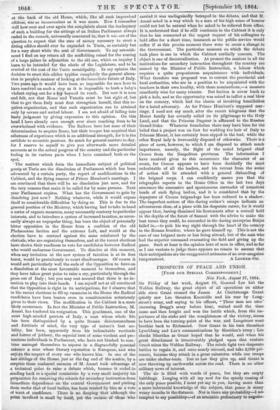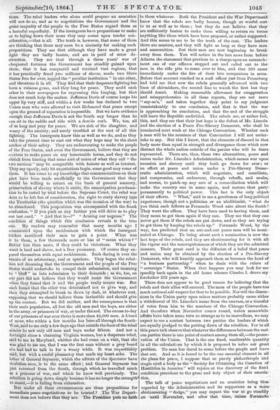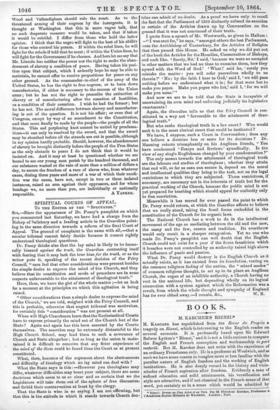PROSPECTS OF PEACE AND UNION.
[FROM OUR SPECIAL CORRESPONDENT.]
New York, August 27, 1864. ON Friday of last week, August 19, General Lee lost the Weldon Railway, the great object of all operations on either aide since Grant crossed the James. At Chattanooga Grant quietly saw Lee threaten Knoxville and his rear by Long- street's army, and saying to his officers, " Those men are ours." (meaning Bragg's army before him), waited until the time came and then fought and won the battle which, from the im- portance of the stake and the completeness of the victory, seems to have been the turning-point of the war, and Longstreet went bootless back to Richmond. Now Grant in his turn threatens Lynchburg and Lee's communications by Sheridan's army ; Lee checks Sheridan as Grant hoped that he would, and when his great detachment is irrecoverably pledged upon that venture Grant seizes the Weldon Railway. The rebels fight two desperate battles to regain it, and once nearly succeed, and take 2,000 pri- soners, because they attack in a great rainstorm while our troops are under shelter-tents. But at last they give up, and Grant is now throwing up earthworks across the road. There is no other military news of interest.
The air is filled with words of peace, but they are empty babblings. Longing with all my soul for the speedy coming of the only peace possible, I must yet say to you, having more than a mere inferential knowledge of the subject, that peace is many weary months in the distance. Nor is there any probability—I am tempted to say possibility,-of an'armistice preliminary to negotia-
tions. The rebel leaders who alone could propose an armistice will not do so, and as to negotiations the Government and the great majority of the people in the Free States regard them as a harmful superfluity. If the insurgents have propositions to make as to laying down their arms they may count upon tender con- sideration,—that is all. The truth is, however, that some of them are thinking that there may soon be a necessity for making such propositions. They see that although they have made a great fight they are badly beaten, and are in peril of utter de- struction. They see that through a three years' war of chequered fortunes the Government has steadily gained upon them, that it has conquered and retained vast regions, that it has practically freed two millions of slaves, made two Slave States free for ever, sapped the " peculiar institution " in one other, and threatens it in all. They find that their desperate fighting has been a ruinous game, and they long for peace. .They scold each other in their newspapers for expressing this longing, but that does not much help the matter. Jefferson Davis of course keeps his upper lip very stiff, and within a few weeks has declared to two Union men who were allowed to visit Richmond that peace except upon the ground of separation is impossible. But we have evidence enough that Jefferson Davis is not the South any longer than he can sit in the saddle and ride with a double curb. We, too, all of us long and pray for peace. We are sick of the slaughter, and weary of the anxiety, and sorely troubled at the cost of all this fighting. The insurgents know this as well as we do, and so they take the present time to cast out what they hope may be the sheet anchor of their safety. They are endeavouring to make the people of the Free States, and even the Government, believe that they are anxious to make peace en any honourable terms, and they do not shrink from hinting that some sort of union of what they call " the two sections " may be compatible with honour as well as interest. They say openly, only let negotiations begin, some good may come of them. It has come to my knowledge that communications on their part have been made unofficially to the Government that they would be willing to return on the basis of general amnesty, preservation of slavery where it exists, the emancipation proclama- tion to be tested by trial before the Supreme Court, the rebel war debt to be left 5ut of consideration, the right to carry slavery into the Territories (the question which was thb occasion of the war) to be abandoned. This proposition was accompanied with the frank confession, " If you push us any farther you will drive us to play our last card." " And that is—?" " Arming our negroes." The condition of things which this confession reveals is the true one. My readers may remember that many months ago I commented upon the recklessness with which the insurgent leaders sacrificed their men to gain a point. What was it to them, a few thousands more or less of " mean whites ? " Better less than more, if they could be victorious. What they want is laud and slaves, not a free yeomanry. Of course they ex- posed themselves with equal recklessness. Such daring is ever the tenure of an aristocracy, real or spurious. They began the rebel- lion not dreaming that the Government and the people of the Free States would undertake to compel their submission, and meaning to " bluff " us into submission to their demands ; as ive, too, on our part did not believe that they would resist the Goverinient when they found that it and the people really meant war. But each found that the other was determined not to give way, and then they attempted to break us down by dash, at whatever cost, supposing that we should believe them invincible and should give up the contest. But we did neither, and the consequence is that their male population, all but the old men and the boys, are either in the army, or prisoners'of war, or under the sod. The excess to-day of our prisoners of war over theirs is more than 40,000 men. A friend of mine, who within a few months has been all through the South- West, said to me only a few days ago that outside the lines of the rebel armies he saw only old men and boys under fifteen. And not a fortnight since a charming Virginia woman, but a desperate rebel, said to me in Maryland, whither she had come on a visit, that she was glad to see me, that I was the first man without a grey beard she had had to talk to for a weary while. It was coquettishly said, but with a rueful pleasantry that made my heart ache. The letter of General Seymour, which the editors of the Spectator have doubtless seen, is to the same effect ; and General Seymour has just returned from the South, through which he travelled much as a prisoner of war, and which he knew well previously. The rebellion is going down simply because it has no longer the strength' to stand,—it is failing from exhaustion.
But under all these circumstances are these propositions for immediate peace negotiations to be trusted ? The War Depart- ment does not believe that they are. The President puts no faith
in them whatever. Both the President and the War Department know that the rebels are badly beaten, though at woeful cost to us as well as to them ; but they do not believe that they are sufficiently beaten to make them willing to return on terms anything like those which have been proposed, or rather suggested. And this seems to me to be the truth of the case. The leaders there are masters, and they will fight as long as they have men and ammunition. But their men are now beginning to break away from them. You will notice in the late news from before Atlanta the statement that previous to a charge upon an entrench- ment one of our officers stepped out and called out to the men in the rifle pits to come over to him, and that 200 came immediately under the fire of their late companions in arms. Before that account reached us a staff officer just from Petersburg had told me that now the rebels generally advanced with two .lines of skirmishers, the second line to watch the first lest they should desert. Making reasonable allowance for exaggeration and misapprehension in all these reports, they are not mere " say-so's," and taken together they point in my judgment unmistakeably to one conclusion, and that is that the war is approaching its conclusion, and that the end of the struggle will leave the Republic undivided. The rebels see, or rather feel, this, and they see that their last hope is the defeat of Mr. Lincoln and the election of a Peace Pro-Slavery Democrat, who shall be nominated next week at the Chicago Convention. Whether such Is man will be the nominee of that Convention I will not under- take to say. But this I know, that the elements of discord in that body more than equal in strength and divergence those which now distract the whole nation outside of the parties who will be there represented. There are, then, these two alternatives, peace and Onion under Mr. Lincoln's Administration, which means war upon secession and slavery until they both go down for ever ; or an effort at peace and union under a Pro-Slavery Demo- cratic administration, which will negotiate, and conciliate, and compromise, and endeavour, through rebuffs, and snubs, and scorns, to patch-up any sort of a reconciliation which will make the country one in name again, and restore that party permanently to political power. This last is the only object Of their efforts. " What," said to me a gentleman of long political experience, though not a politician or an abolitionist, " what do you think such fellows as Fernando Wood care about the South? They want the offices. They have been used to having them, and they mean to get them again if they can. They see that they can never get them if the rebels are put down, and so they are trying to get them by keeping the rebels up." Fernando Wood, by the way, has predicted that an out-and-out peace man will be nomi- nated at Chicago. To bring about such a nomination is now the last hope of the rebels, and they are electioneering for it with all the vigour and the unscrupulousness of which they are the admitted masters. Their great card is the diffusion of a belief that peace and union may be obtained by the election of a Pro-Slavery Democrat, who will humbly approach them as becomes the head of "a business partnership" when he deals with the rulers of " sovereign" States. When that happens you may look for me speedily back again in the old home whence Charles I. drove my forefather 232 years ago.
There does not appear to be good reason for believing that the rebels and their allies will succeed. The mass of the people have too much national self-respect for that to be possible. Nor will the dissen- sions in the Union party upon minor matters probably cause either a withdrawal of Mr. Lincoln's name from the canvass, or a transfer of votes from him to the nominee of the Chicago Convention. And therefore when November comes round, unless meanwhile affairs have taken some turn so strange as to be marvellous, we may expect to see a contest between two parties the leaders of which are equally pledged to the putting down of the rebellion. For in all this peace talk observe that whatever the differences between the vari- ous parties there is one point of contact among them all,—the preser- vation of the Union. That is the one fixed, unalterable quantity in all the calculations by which it is proposed to solve our great problem. No man has dared to come before the people and leave that out. And as it is found to be the one essential element in all the plans for peace, I suppose that so purely philanthropic and single eyed a body as the " Society for Obtaining the Cessation of Hostilities in America" will rejoice at the discovery of the fixed condition precedent to the great and holy object of their associa- tion.
The talk of peace negotiations and an armistice being thus regarded by the Administration and its supporters as a mere electioneering " dodge," you may expect the war to go steadily on until November, and after that time, unless Fernando
Wood and Vallandigham should rale the roast. As to the threatened arming of their negroes by the insurgents, it is thought at Washington that this is mere vague talk, that no such desperate measure would be taken, and that if taken it would be suicidal. I differ from those who hold the latter opinion. I think that the negro will fight to the best of his ability for those who control his person. If within the rebel lines, he will fight for the rebels if told that he must ; if within the Union lines, he will fight for the Government if he chooses. And here let me say that Mr. Lincoln has neither the power nor the right to make the aban- donment of slavery a condition of peace. Having taken his posi- tion upon that subject, which I ardently hope he may be able to maintain, he cannot offer to receive propositions for peace on any other ground. As the commander-in-chief of the army of the United States, he has the right to free negroes, or to burn down manufactories, if either is necessary to the success of the Union arms ; but he has not the right to prescribe the extinction of slavery or of manufacturing after the cessation of hostilities, ns a condition of their cessation. I wish he had the former ; but he has not. The moral difference between slavery and manufactur- ing is out of the question. It is not his affair; or even that of Congress, except by way of an amendment to the Constitution, and that must finally be made by the people—the people of all the States. This sad perplexing knot cannot be untied by proclama- tions—it can only be resolved by the sword, and that the sword may be sheathed before all the strands are cut is possible, although in my opinion hardly probable. Should, however, the abandonment of slavery be brought distinctly before the people of the Free States as the only obstacle to peace I do not think that it would be insisted on. And it may at least be questioned whether we are bound to see our young men perish by the hundred thousand, and our substance wasted at the rate of more than a million of dollars a day, to secure the freedom of a race of slaves who, from whatever cause, during three years and more of a war of which their condi- tion was the cause, have not, except in two or three isolated instances, raised an arm against their oppressors, and for whose bondage we, no more than you, are individually or nationally
































 Previous page
Previous page